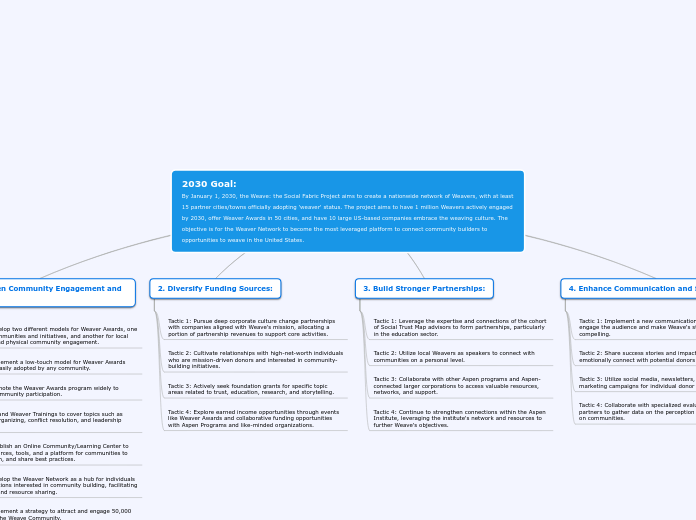2030 Goal:
By January 1, 2030, the Weave: the Social Fabric Project aims to create a nationwide network of Weavers, with at least 15 partner cities/towns officially adopting 'weaver' status. The project aims to have 1 million Weavers actively engaged by 2030, offer Weaver Awards in 50 cities, and have 10 large US-based companies embrace the weaving culture. The objective is for the Weaver Network to become the most leveraged platform to connect community builders to opportunities to weave in the United States.
1. Strengthen Community Engagement and Expansion:
Tactic 1: Develop two different models for Weaver Awards, one for online communities and initiatives, and another for local gatherings and physical community engagement.
Tactic 2: Implement a low-touch model for Weaver Awards that can be easily adopted by any community.
Tactic 3: Promote the Weaver Awards program widely to encourage community participation.
Tactic 4: Expand Weaver Trainings to cover topics such as community organizing, conflict resolution, and leadership development.
Tactic 5: Establish an Online Community/Learning Center to provide resources, tools, and a platform for communities to connect, learn, and share best practices.
Tactic 6: Develop the Weaver Network as a hub for individuals and organizations interested in community building, facilitating connections and resource sharing.
Tactic 7: Implement a strategy to attract and engage 50,000 members in the Weave Community.
Tactic 8: Promote community engagement and collaboration among Weave Community members.
Tactic 9: Foster long-term, three-year community collaborations involving various stakeholders to address complex community challenges.
2. Diversify Funding Sources:
Tactic 1: Pursue deep corporate culture change partnerships with companies aligned with Weave's mission, allocating a portion of partnership revenues to support core activities.
Tactic 2: Cultivate relationships with high-net-worth individuals who are mission-driven donors and interested in community-building initiatives.
Tactic 3: Actively seek foundation grants for specific topic areas related to trust, education, research, and storytelling.
Tactic 4: Explore earned income opportunities through events like Weaver Awards and collaborative funding opportunities with Aspen Programs and like-minded organizations.
3. Build Stronger Partnerships:
Tactic 1: Leverage the expertise and connections of the cohort of Social Trust Map advisors to form partnerships, particularly in the education sector.
Tactic 2: Utilize local Weavers as speakers to connect with communities on a personal level.
Tactic 3: Collaborate with other Aspen programs and Aspen-connected larger corporations to access valuable resources, networks, and support.
Tactic 4: Continue to strengthen connections within the Aspen Institute, leveraging the institute's network and resources to further Weave's objectives.
4. Enhance Communication and Storytelling:
Tactic 1: Implement a new communication strategy to better engage the audience and make Weave's stories more compelling.
Tactic 2: Share success stories and impact narratives to emotionally connect with potential donors and supporters.
Tactic 3: Utilize social media, newsletters, and targeted marketing campaigns for individual donor engagement.
Tactic 4: Collaborate with specialized evaluation and survey partners to gather data on the perception of Weave's impact on communities.
